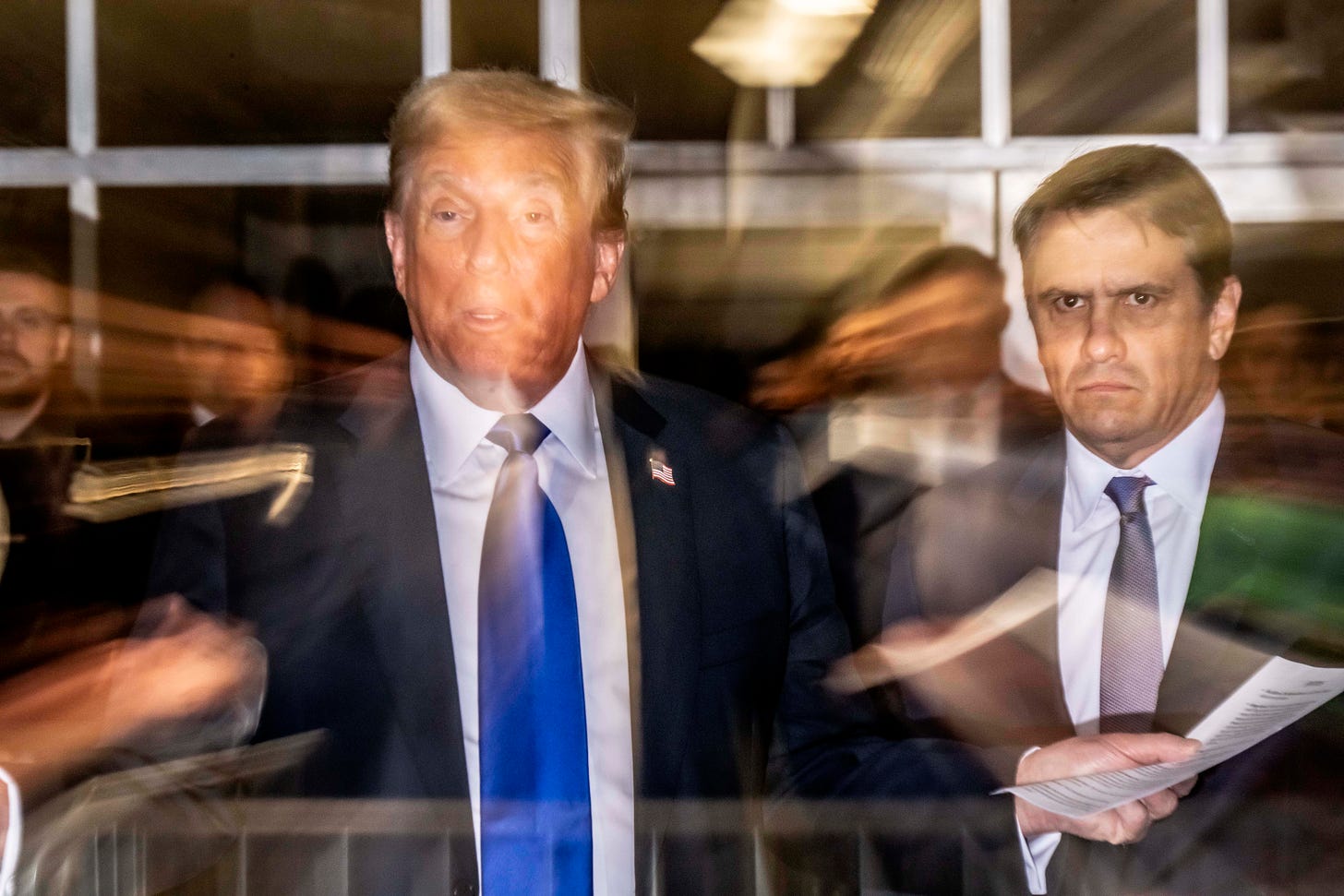
Trump Got Due Process and Then Some
No matter his or his allies’ feelings about the verdict, it was based on evidence, testimony, and argument—not conspiracy.

FOLLOWING LAST THURSDAY’S JURY VERDICT convicting Donald Trump on 34 felony charges in New York, speculation has already begun about the feasibility of his anticipated appeal, whether he could actually see jail time, and whether the verdict will wind up helping Trump in the 2024 presidential election, further polarizing the nation. Answers to those questions will become clearer in the weeks and months ahead, but for now, we should take this moment to step back and appreciate the big picture, which is this:
At a time when American democracy is at risk, just 157 days before the election, the rule of law prevailed.
The concept of the rule of law can be traced back into the mists of history. It took an unmistakable step into the bright sunshine on the Runnymede field along England’s River Thames in 1215 when King John, pressured by powerful noblemen and barons who were tired of him trampling on their rights, signed the Magna Carta, which states that “No freemen shall be taken or imprisoned . . . except by lawful judgment of his peers or by the law of the land.” This language deprived the king of unilateral power to take someone’s liberty arbitrarily, without grounding in facts or law. It was an important step away from monarchical absolutism, the notion that the divinely empowered sovereign could not be held accountable in the exercise of unlimited authority. Perhaps ironically, this is not unlike the kind of tyrannical power that Trump promises if elected in November.
This article is free, like most of what we do at The Bulwark. But if you want unlimited access to members-only podcasts, newsletters, and live events, become a Bulwark+ member today. Click below to get a 30-day trial free.
By the American era, the protection of rights that began in the Magna Carta had become more sophisticated, enshrined preeminently in the due process clauses of the Fifth Amendment (which binds the federal government) and the Fourteenth Amendment (which binds the states). The Framers of the Constitution also added a host of other protections for criminal defendants, including the right to remain silent (Fifth Amendment); the right to confront witnesses (Sixth); the right to a speedy, public trial by jury (Sixth); the right to defense counsel (Sixth); the ban on double jeopardy for the same crime (Fifth); the rights against unreasonable and warrantless searches and seizures (Fourth); the ban on cruel and unusual punishment (Eighth); and the overarching idea of “fundamental fairness essential to the very concept of justice.” Donald Trump got them all.
In all likelihood, in fact, Trump got more process than he was due. Nobody in the history of the American criminal justice system has had access to his election-donor funded trial defense team, his supplicant band of congressional Republicans attacking the rule of law and the criminal justice system on his behalf, his Truth Social megaphone of lies, and his compliant Supreme Court majority—who effectively excised Section 3 of the Fourteenth Amendment from the Constitution on his behalf and punted the January 6th criminal trial until after the election in order to craft criminal immunity for him.
Which is to say, despite the wailing you may have been hearing from Republicans on social media: Trump is no victim. Far from it.
Consider that until as recently as 2019, New York—like many states—allowed judges to impose cash bail for nonviolent felonies, which meant that individuals were jailed because they could not pay for their release pending trial. So much for innocent until proven guilty for people who are poor, and mostly non-white.
MOREOVER, THE FACTS FAVORING conviction in this case—which were admitted into evidence pursuant to stringent standards of reliability—were nearly insurmountable. Over a six-week trial, on 34 counts of falsifying business records to conceal a payment to Stormy Daniels in the days leading up to the 2016 election, the prosecution submitted into evidence 34 documents, 11 invoices, 12 vouchers, 11 checks, and the sworn testimony of 22 witnesses. Prosecutors also introduced an audio recording of Trump discussing paying cash to quiet Karen McDougal, which was secretly taped by Michael Cohen in August of 2016. David Pecker, former publisher of the National Enquirer, testified that he paid McDougal $150,000 specifically to help Trump’s 2016 campaign. He also said Trump held a “thank you” dinner for him at the White House in July 2017, at which Trump asked, “How’s Karen doing?”
So Trump’s own voice, and Pecker’s testimony, cemented his knowledge of the hush money scheme. The Access Hollywood tape, in which Trump bragged about committing sexual assault on a hot mic, came out on October 7, 2016, and on October 27, Cohen paid Stormy Daniels $130,000 from his home equity line of credit to conceal his boss’s sexual encounter with her. Does anyone really believe Trump wasn’t behind this? And that his goal was something other than to dupe voters? When Cohen was finally repaid, Trump signed the majority of the $35,000 monthly checks from his personal bank account. The government introduced evidence of Trump puffing for years about keeping a tight rein on his finances.
Among a number of smoking guns, the jury also saw handwritten notes by Trump CFO Allen Weisselberg (currently serving time in Rikers prison for perjury) on a document showing the “gross up” of the $130,000 (plus some unrelated payments) to $420,000, which the document indicated was “X 2 FOR TAXES.” Trump’s defense—which included the ridiculous suggestion that Daniels (less than half his age at the time) manufactured her story of a sexual encounter with him—was that the $420,000 was for legal fees, not reimbursement. But documents don’t lie. As for the defense’s argument that the payment was to protect his family from embarrassment, Trump’s former aide, Hope Hicks, testified that the campaign was in a panic over the Access Hollywood tape, which is of course obvious. She also destroyed the defense’s assertion that Cohen and Weisselberg did this all on their own, saying that would not be “in character” for Cohen.
The problem for the defense was that Trump is addicted to lying and cannot accept responsibility for anything. His lawyers went too far in their unvarnished denialism, likely tarnishing their own credibility with the jury, and depriving him of any conceivably reasonable counternarrative to the government’s story. The jury needed doubt for which they could give a reason. In this case, there was none.
Trump will have every opportunity to appeal his case—and more resources to pay for expensive lawyers than the vast majority of criminal defendants, most of whom rely on overworked public defenders whose services aren’t even guaranteed for all criminal proceedings. But it’s not hard to see why, when subjected to the rule of law like everyone else, a jury of Trump’s peers in New York unanimously found him guilty. It wasn’t because of the judge or the prosecutor or the Biden administration. It was because of the evidence.
















